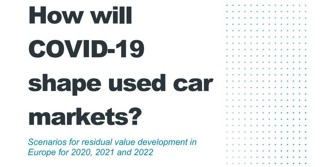Used car retailers have been urged to “hold their nerve” and not rush to liquidate stock ahead of an anticipated rise in sales demand following June 1’s re-opening of car showrooms across the UK.
Valuations experts at Cap HPI have warned that the sector could be headed for a volatile period due to fluctuations in supply and demand as the automotive retail sector navigates out of the COVID-19 coronavirus lockdown period.
Prime Minister Boris Johnson confirmed in a press conference last night that showrooms would be allowed to open from June 1, a fortnight ahead of many other retail businesses.
But Cap HPI is calling for vendors to “hold their nerve and not rush to liquidate stock as lockdown ends”.
Derren Martin, head of valuations UK at Cap HPI, said: “The car industry and indeed country as a whole has never been in a situation like this before.”
Martin said that the post-June 1 period “is likely to be a volatile period for pricing”. He added: “There will be some pent-up demand from consumers, but much of the population remain furloughed and are unlikely to be actively choosing to make big-ticket purchases.
“Even those that are working are likely to be prudent, with a recession inevitable and a proportion of savings currently wiped out.
“For stability in the market, it will be down to vendors at every stage of the remarketing journey holding their nerve, as the majority of car dealers have done on price thus far.
“If rental, fleet, leasing and finance houses choose to liquidate stock, there may well be an over-supply situation in a few weeks, especially as many franchised dealers will not be in the market to buy in volume for a number of weeks, as they clear the decks of March part-exchanges and come under pressure from manufacturers to take late-plate or unregistered cars.”
The industry currently can cope with a reasonable level of defleeting, according to Cap HPI. However, it warned that it would not take much for this to tip the scales towards over-supply.
Speaking to AM earlier this month, Suzuki GB’s director of automobile, Dale Wyatt, said that used car values were among his key concerns for the financial health of his retail network and said that retailers would have to maintain perspective as trading resumes.
He said: “We cannot have our retailers treating these days of lockdown as if they were normal trading days.
“When the market returns we cannot afford to have retailers approaching their stock like it’s suddenly 90-day over-age. I think we’ll need to be more patient than that to minimise the impact of the lockdown period.”
Less than a fortnight ago Autovista said that ageing stock had been the “main driver” of £1.6 billion losses incurred by Europe’s used car retail sector between the start of the COVID-19 coronavrius lockdown and mid-April.
Autovista’s ‘Scenarios for residual value development in Europe for 2020, 2021 and 2022’ whitepaper said that said that it expects losses in residual values observed across markets “to build up over the coming weeks and months”.
Cap HPI’s latest market insight said that an increase in the volumes of sales data becoming available between May 11 and the end of this month had justified value movements for vehicles between five and twenty-years-old.
However, it claimed that, of the model ranges analysed only half have actually been moved in value.
The average movement of those that did move was -2.0% down, although some have moved by as much as -5%.
Cap HPI said that early post-lockdown demand for used cars would centre around smaller, cheaper cars under an £8,000 retail price point or around £100 to 120 per month, as many buyers may have been motivated by a desire to move away from public transport.
Older examples of German premium cars are also likely to be in demand, it said, more so than expensive late-plate models of all brands, which may well be over-supplied due to volumes of either registered or unregistered cars from March.
Martin said: “We would encourage vendors to keep close to cap Live valuations as well as look back at their mid-March values as a barometer.
“If consumer demand is relatively healthy, as it may be due to a lack of new car supply, PCPs ending or a reluctance to use public transport, then prices may not need adjusting by much.”



















Login to comment
Comments
No comments have been made yet.